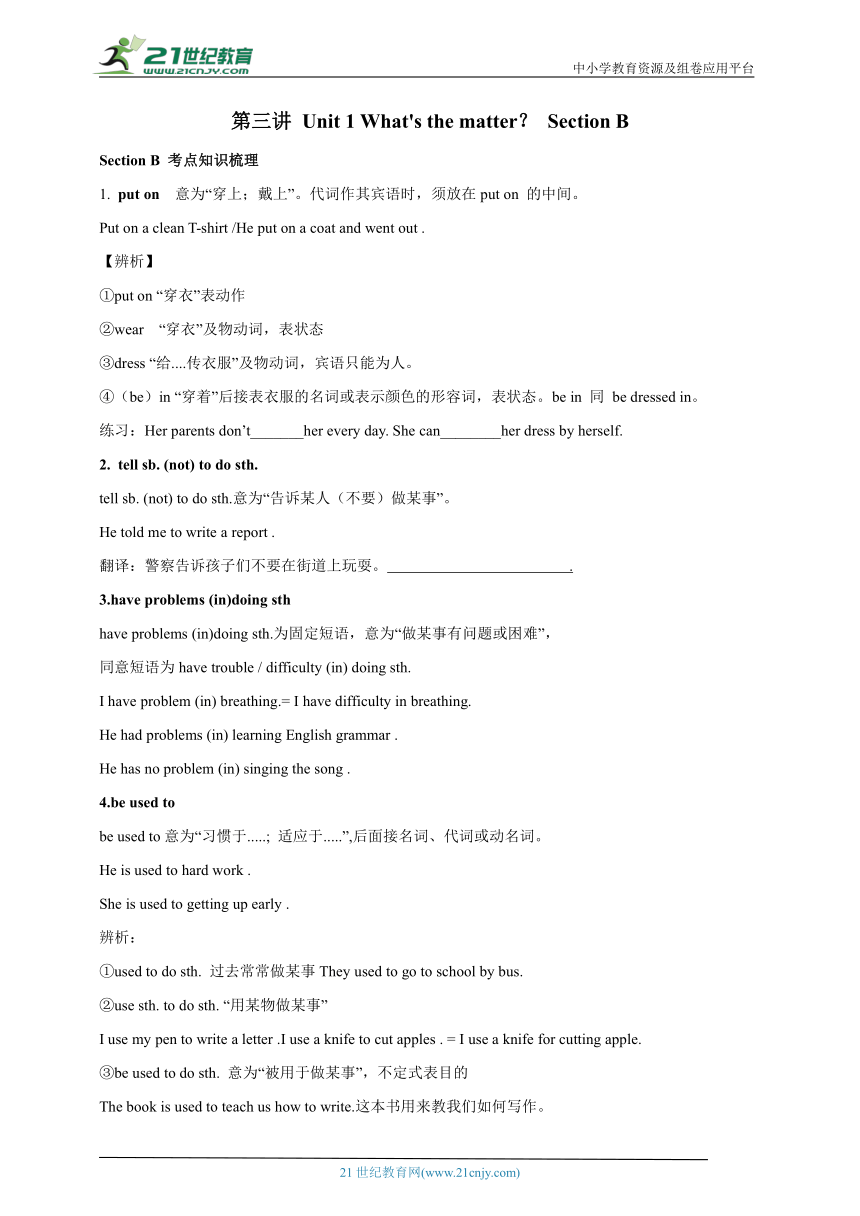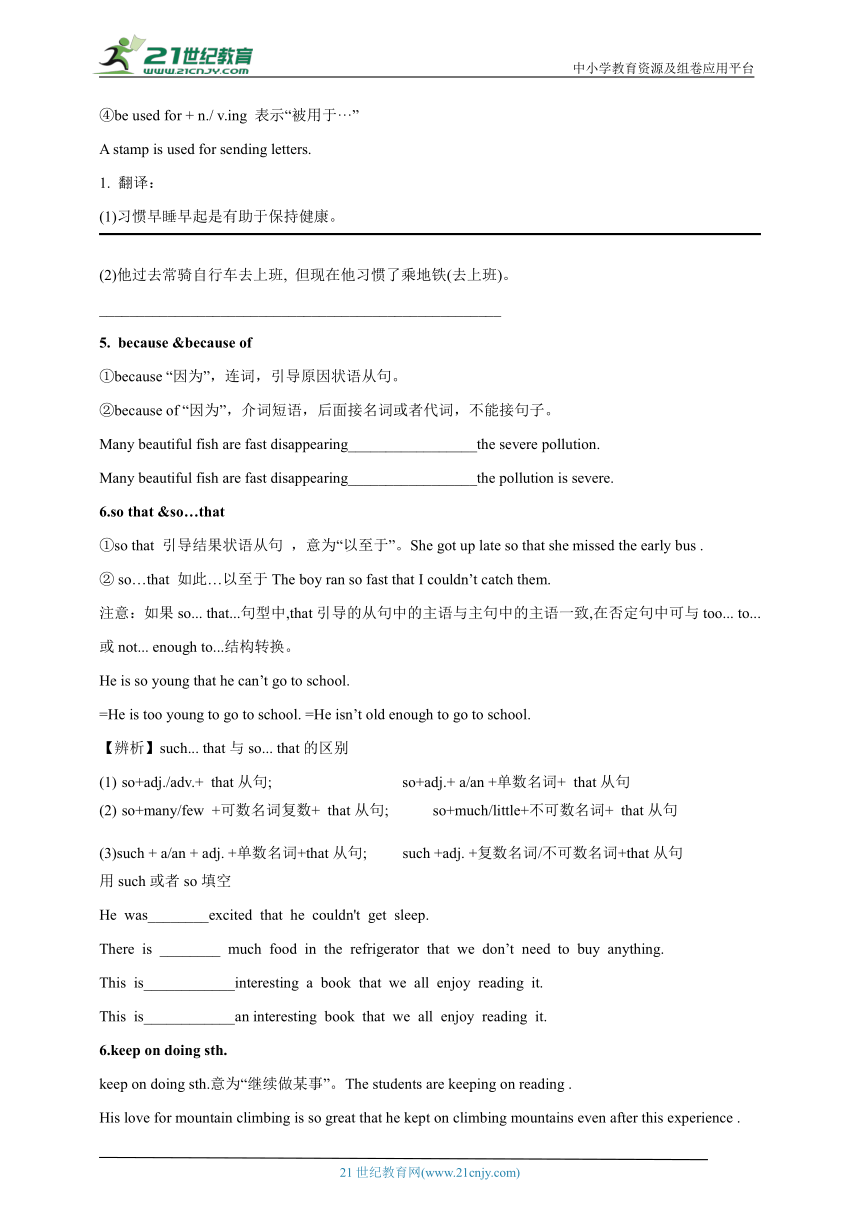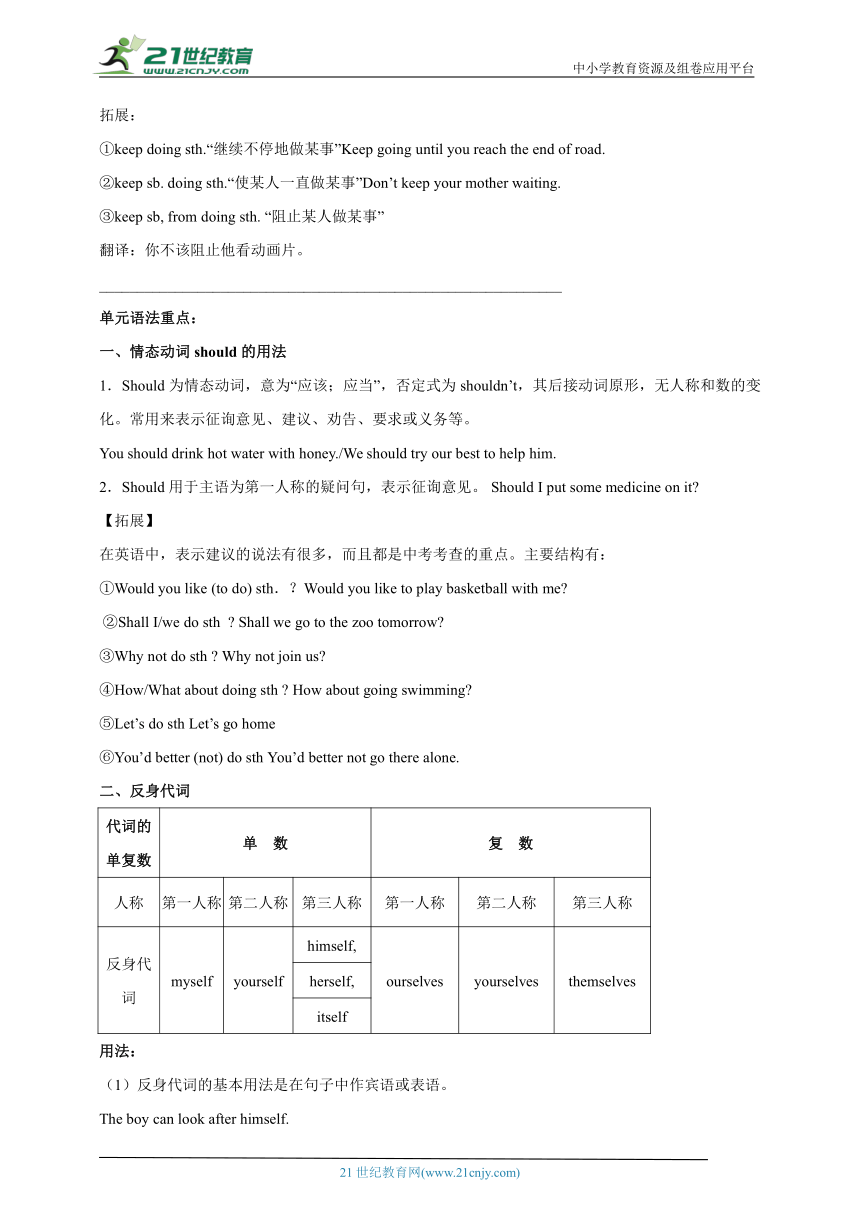【寒假学案】2024年人教版初二英语寒假教材 第三讲 Unit 1 What's the matter Section B 学案-(含答案)
文档属性
| 名称 | 【寒假学案】2024年人教版初二英语寒假教材 第三讲 Unit 1 What's the matter Section B 学案-(含答案) |  | |
| 格式 | doc | ||
| 文件大小 | 462.2KB | ||
| 资源类型 | 试卷 | ||
| 版本资源 | 人教新目标(Go for it)版 | ||
| 科目 | 英语 | ||
| 更新时间 | 2023-12-27 20:39:29 | ||
图片预览



文档简介
中小学教育资源及组卷应用平台
第三讲 Unit 1 What's the matter? Section B
Section B 考点知识梳理
put on 意为“穿上;戴上”。代词作其宾语时,须放在put on 的中间。
Put on a clean T-shirt /He put on a coat and went out .
【辨析】
①put on “穿衣”表动作
②wear “穿衣”及物动词,表状态
③dress “给....传衣服”及物动词,宾语只能为人。
④(be)in “穿着”后接表衣服的名词或表示颜色的形容词,表状态。be in 同 be dressed in。
练习:Her parents don’t_______her every day. She can________her dress by herself.
tell sb. (not) to do sth.
tell sb. (not) to do sth.意为“告诉某人(不要)做某事”。
He told me to write a report .
翻译:警察告诉孩子们不要在街道上玩耍。 .
have problems (in)doing sth
have problems (in)doing sth.为固定短语,意为“做某事有问题或困难”,
同意短语为have trouble / difficulty (in) doing sth.
I have problem (in) breathing.= I have difficulty in breathing.
He had problems (in) learning English grammar .
He has no problem (in) singing the song .
be used to
be used to意为“习惯于.....; 适应于.....”,后面接名词、代词或动名词。
He is used to hard work .
She is used to getting up early .
辨析:
①used to do sth. 过去常常做某事They used to go to school by bus.
②use sth. to do sth. “用某物做某事”
I use my pen to write a letter .I use a knife to cut apples . = I use a knife for cutting apple.
③be used to do sth. 意为“被用于做某事”,不定式表目的
The book is used to teach us how to write.这本书用来教我们如何写作。
④be used for + n./ v.ing 表示“被用于···”
A stamp is used for sending letters.
翻译:
(1)习惯早睡早起是有助于保持健康。
(2)他过去常骑自行车去上班, 但现在他习惯了乘地铁(去上班)。
_____________________________________________________
because &because of
①because “因为”,连词,引导原因状语从句。
②because of “因为”,介词短语,后面接名词或者代词,不能接句子。
Many beautiful fish are fast disappearing_________________the severe pollution.
Many beautiful fish are fast disappearing_________________the pollution is severe.
6.so that &so…that
①so that 引导结果状语从句 ,意为“以至于”。She got up late so that she missed the early bus .
② so…that 如此…以至于The boy ran so fast that I couldn’t catch them.
注意:如果so... that...句型中,that引导的从句中的主语与主句中的主语一致,在否定句中可与too... to...或not... enough to...结构转换。
He is so young that he can’t go to school.
=He is too young to go to school. =He isn’t old enough to go to school.
【辨析】such... that与so... that的区别
so+adj./adv.+ that从句; so+adj.+ a/an +单数名词+ that从句
so+many/few +可数名词复数+ that从句; so+much/little+不可数名词+ that从句
(3)such + a/an + adj. +单数名词+that从句; such +adj. +复数名词/不可数名词+that从句
用such或者so填空
He was________excited that he couldn't get sleep.
There is ________ much food in the refrigerator that we don’t need to buy anything.
This is____________interesting a book that we all enjoy reading it.
This is____________an interesting book that we all enjoy reading it.
keep on doing sth.
keep on doing sth.意为“继续做某事”。The students are keeping on reading .
His love for mountain climbing is so great that he kept on climbing mountains even after this experience .
拓展:
①keep doing sth.“继续不停地做某事”Keep going until you reach the end of road.
②keep sb. doing sth.“使某人一直做某事”Don’t keep your mother waiting.
③keep sb, from doing sth. “阻止某人做某事”
翻译:你不该阻止他看动画片。
_____________________________________________________________
单元语法重点:
一、情态动词should的用法
Should为情态动词,意为“应该;应当”,否定式为shouldn’t,其后接动词原形,无人称和数的变化。常用来表示征询意见、建议、劝告、要求或义务等。
You should drink hot water with honey./We should try our best to help him.
Should用于主语为第一人称的疑问句,表示征询意见。 Should I put some medicine on it
【拓展】
在英语中,表示建议的说法有很多,而且都是中考考查的重点。主要结构有:
①Would you like (to do) sth.?Would you like to play basketball with me
②Shall I/we do sth Shall we go to the zoo tomorrow
③Why not do sth Why not join us
④How/What about doing sth How about going swimming
⑤Let’s do sth Let’s go home
⑥You’d better (not) do sth You’d better not go there alone.
二、反身代词
代词的单复数 单 数 复 数
人称 第一人称 第二人称 第三人称 第一人称 第二人称 第三人称
反身代词 myself your self himself, ourselves yourselves themselves
herself,
itself
用法:
反身代词的基本用法是在句子中作宾语或表语。
The boy can look after himself.
常用在动词enjoy,teach,help,buy,wash,hurt,be,look after等词后以及一些介词后。如:buy oneself sth.(为自己购置某物)、enjoy oneself(过得愉快)、help oneself to some food(随便吃点食物)、teach oneself(自学)、wash oneself(自己洗澡)、look after oneself(自己照料自己)
(2)在句子中作主语或宾语的同位语,用来加强语气,表示“亲自,本人”,一般置于被说明的词之后;作主语的同位语时,还可放在句末。如:
Lucy herself told me the news. /You had better ask the driver himself.
练习1.As we all have grown up, we should learn to look after .
A.ourselves B.us C.myself
2. Miss Smith, an American lady, has taught English for three years.
A.we B.us C.our
课后习题
二、根据句意用括号中所给单词的适当形式填空,每空一词。
1. I think we won't have any problems (work) out the problem.
2. It is very important to make a correct (decide).
3. He kept on (talk) until the class was over.
4. She should do her homework by (her).
5. He finally realized the (important) of health.
6. She was ill and had to (go) to a doctor.
7. He can stay there for ten hours without (move).
8. We expect (visit) the Great Wall one day.
9. They don’t mind (climb) the mountain.
10. He told me (not wait) for him
三、完型填空
Stuart and Steve were twin brothers. Stuart loved to play basketball. But Steve loved to read books. One day Stuart was playing basketball 1 he fell and broke his leg. When they took him to the hospital, the doctor said he wouldn’t be able to play for six months. Steve went 2 him and brought him books on basketball. At first Stuart wasn’t going to read them. Then he began to read them and 3 that there were ways he could play basketball better. He began to think that books weren’t 4 .
When Stuart’s leg started getting better, Steve would help him by going for walks with him. 5 Stuart’s doctor said he could start playing basketball again. Then Stuart showed Steve how to toss(投) for baskets. Steve found that he enjoyed it.
Then Stuart was ready to 6 the basketball games. Steve went to watch the games and enjoyed himself. They then 7 practiced basketball and read books together.
So you can see, when 8 happens, something good may also happen. Steve showed Stuart about books and Stuart showed Steve about basketball. So you can also 9 showing others something that you like to do and they can show you something that they like to do. 10 you can find new things to do.
1.A.until B.when C.after
2.A.on seeing B.to look C.to visit
3.A.saw B.looked C.found
4.A.good B.bad C.better
5.A.But B.However C.Finally
6.A.take part B.join in C.lose
7.A.always B.never C.seldom
8.A.anything wrong B.something nice C.something bad
9.A.try B.practice C.enjoy
10.A.On the way B.By the way C.In this way
语篇翻译
At 9:00 a.m. yesterday, bus No. 26 was going along Zhonghua Road. 21.司机看见一个老人正躺在路边。 He sopped the bus without thinking twice. 22 He got off and asked the woman what happened. She said that the man had the heart problem and should go to the hospital. 23. He expected most or of the passengers to get off. 24.但令人惊讶的是,他们都同意和他一起去。
Thanks to Mr. Wang and passengers, the man was saved by the doctors in time. The driver didn't think about himself. 25. He only thought about saving a life.
21. .
22. .
23. .
24. .
25. .
参考答案
二、填空题
(1)working (2)decision (3)talking (4)herself (5)importance
(6)go (7)moving (8)to visit (9) climbing (10) not to wait
三、完型填空
1-5 BCCBC 6-10 BACAC
翻译
21 The driver saw an old man lying on the side of the road.
22. 他下车问女士发生了什么事。
23. 他以为大部分或者所有的乘客都会下车。
24. But to his surprise, they all agreed to go with him.
25. 他仅仅只想到了救人生命。
21世纪教育网 www.21cnjy.com 精品试卷·第 2 页 (共 2 页)
HYPERLINK "http://21世纪教育网(www.21cnjy.com)
" 21世纪教育网(www.21cnjy.com)
第三讲 Unit 1 What's the matter? Section B
Section B 考点知识梳理
put on 意为“穿上;戴上”。代词作其宾语时,须放在put on 的中间。
Put on a clean T-shirt /He put on a coat and went out .
【辨析】
①put on “穿衣”表动作
②wear “穿衣”及物动词,表状态
③dress “给....传衣服”及物动词,宾语只能为人。
④(be)in “穿着”后接表衣服的名词或表示颜色的形容词,表状态。be in 同 be dressed in。
练习:Her parents don’t_______her every day. She can________her dress by herself.
tell sb. (not) to do sth.
tell sb. (not) to do sth.意为“告诉某人(不要)做某事”。
He told me to write a report .
翻译:警察告诉孩子们不要在街道上玩耍。 .
have problems (in)doing sth
have problems (in)doing sth.为固定短语,意为“做某事有问题或困难”,
同意短语为have trouble / difficulty (in) doing sth.
I have problem (in) breathing.= I have difficulty in breathing.
He had problems (in) learning English grammar .
He has no problem (in) singing the song .
be used to
be used to意为“习惯于.....; 适应于.....”,后面接名词、代词或动名词。
He is used to hard work .
She is used to getting up early .
辨析:
①used to do sth. 过去常常做某事They used to go to school by bus.
②use sth. to do sth. “用某物做某事”
I use my pen to write a letter .I use a knife to cut apples . = I use a knife for cutting apple.
③be used to do sth. 意为“被用于做某事”,不定式表目的
The book is used to teach us how to write.这本书用来教我们如何写作。
④be used for + n./ v.ing 表示“被用于···”
A stamp is used for sending letters.
翻译:
(1)习惯早睡早起是有助于保持健康。
(2)他过去常骑自行车去上班, 但现在他习惯了乘地铁(去上班)。
_____________________________________________________
because &because of
①because “因为”,连词,引导原因状语从句。
②because of “因为”,介词短语,后面接名词或者代词,不能接句子。
Many beautiful fish are fast disappearing_________________the severe pollution.
Many beautiful fish are fast disappearing_________________the pollution is severe.
6.so that &so…that
①so that 引导结果状语从句 ,意为“以至于”。She got up late so that she missed the early bus .
② so…that 如此…以至于The boy ran so fast that I couldn’t catch them.
注意:如果so... that...句型中,that引导的从句中的主语与主句中的主语一致,在否定句中可与too... to...或not... enough to...结构转换。
He is so young that he can’t go to school.
=He is too young to go to school. =He isn’t old enough to go to school.
【辨析】such... that与so... that的区别
so+adj./adv.+ that从句; so+adj.+ a/an +单数名词+ that从句
so+many/few +可数名词复数+ that从句; so+much/little+不可数名词+ that从句
(3)such + a/an + adj. +单数名词+that从句; such +adj. +复数名词/不可数名词+that从句
用such或者so填空
He was________excited that he couldn't get sleep.
There is ________ much food in the refrigerator that we don’t need to buy anything.
This is____________interesting a book that we all enjoy reading it.
This is____________an interesting book that we all enjoy reading it.
keep on doing sth.
keep on doing sth.意为“继续做某事”。The students are keeping on reading .
His love for mountain climbing is so great that he kept on climbing mountains even after this experience .
拓展:
①keep doing sth.“继续不停地做某事”Keep going until you reach the end of road.
②keep sb. doing sth.“使某人一直做某事”Don’t keep your mother waiting.
③keep sb, from doing sth. “阻止某人做某事”
翻译:你不该阻止他看动画片。
_____________________________________________________________
单元语法重点:
一、情态动词should的用法
Should为情态动词,意为“应该;应当”,否定式为shouldn’t,其后接动词原形,无人称和数的变化。常用来表示征询意见、建议、劝告、要求或义务等。
You should drink hot water with honey./We should try our best to help him.
Should用于主语为第一人称的疑问句,表示征询意见。 Should I put some medicine on it
【拓展】
在英语中,表示建议的说法有很多,而且都是中考考查的重点。主要结构有:
①Would you like (to do) sth.?Would you like to play basketball with me
②Shall I/we do sth Shall we go to the zoo tomorrow
③Why not do sth Why not join us
④How/What about doing sth How about going swimming
⑤Let’s do sth Let’s go home
⑥You’d better (not) do sth You’d better not go there alone.
二、反身代词
代词的单复数 单 数 复 数
人称 第一人称 第二人称 第三人称 第一人称 第二人称 第三人称
反身代词 myself your self himself, ourselves yourselves themselves
herself,
itself
用法:
反身代词的基本用法是在句子中作宾语或表语。
The boy can look after himself.
常用在动词enjoy,teach,help,buy,wash,hurt,be,look after等词后以及一些介词后。如:buy oneself sth.(为自己购置某物)、enjoy oneself(过得愉快)、help oneself to some food(随便吃点食物)、teach oneself(自学)、wash oneself(自己洗澡)、look after oneself(自己照料自己)
(2)在句子中作主语或宾语的同位语,用来加强语气,表示“亲自,本人”,一般置于被说明的词之后;作主语的同位语时,还可放在句末。如:
Lucy herself told me the news. /You had better ask the driver himself.
练习1.As we all have grown up, we should learn to look after .
A.ourselves B.us C.myself
2. Miss Smith, an American lady, has taught English for three years.
A.we B.us C.our
课后习题
二、根据句意用括号中所给单词的适当形式填空,每空一词。
1. I think we won't have any problems (work) out the problem.
2. It is very important to make a correct (decide).
3. He kept on (talk) until the class was over.
4. She should do her homework by (her).
5. He finally realized the (important) of health.
6. She was ill and had to (go) to a doctor.
7. He can stay there for ten hours without (move).
8. We expect (visit) the Great Wall one day.
9. They don’t mind (climb) the mountain.
10. He told me (not wait) for him
三、完型填空
Stuart and Steve were twin brothers. Stuart loved to play basketball. But Steve loved to read books. One day Stuart was playing basketball 1 he fell and broke his leg. When they took him to the hospital, the doctor said he wouldn’t be able to play for six months. Steve went 2 him and brought him books on basketball. At first Stuart wasn’t going to read them. Then he began to read them and 3 that there were ways he could play basketball better. He began to think that books weren’t 4 .
When Stuart’s leg started getting better, Steve would help him by going for walks with him. 5 Stuart’s doctor said he could start playing basketball again. Then Stuart showed Steve how to toss(投) for baskets. Steve found that he enjoyed it.
Then Stuart was ready to 6 the basketball games. Steve went to watch the games and enjoyed himself. They then 7 practiced basketball and read books together.
So you can see, when 8 happens, something good may also happen. Steve showed Stuart about books and Stuart showed Steve about basketball. So you can also 9 showing others something that you like to do and they can show you something that they like to do. 10 you can find new things to do.
1.A.until B.when C.after
2.A.on seeing B.to look C.to visit
3.A.saw B.looked C.found
4.A.good B.bad C.better
5.A.But B.However C.Finally
6.A.take part B.join in C.lose
7.A.always B.never C.seldom
8.A.anything wrong B.something nice C.something bad
9.A.try B.practice C.enjoy
10.A.On the way B.By the way C.In this way
语篇翻译
At 9:00 a.m. yesterday, bus No. 26 was going along Zhonghua Road. 21.司机看见一个老人正躺在路边。 He sopped the bus without thinking twice. 22 He got off and asked the woman what happened. She said that the man had the heart problem and should go to the hospital. 23. He expected most or of the passengers to get off. 24.但令人惊讶的是,他们都同意和他一起去。
Thanks to Mr. Wang and passengers, the man was saved by the doctors in time. The driver didn't think about himself. 25. He only thought about saving a life.
21. .
22. .
23. .
24. .
25. .
参考答案
二、填空题
(1)working (2)decision (3)talking (4)herself (5)importance
(6)go (7)moving (8)to visit (9) climbing (10) not to wait
三、完型填空
1-5 BCCBC 6-10 BACAC
翻译
21 The driver saw an old man lying on the side of the road.
22. 他下车问女士发生了什么事。
23. 他以为大部分或者所有的乘客都会下车。
24. But to his surprise, they all agreed to go with him.
25. 他仅仅只想到了救人生命。
21世纪教育网 www.21cnjy.com 精品试卷·第 2 页 (共 2 页)
HYPERLINK "http://21世纪教育网(www.21cnjy.com)
" 21世纪教育网(www.21cnjy.com)
同课章节目录
